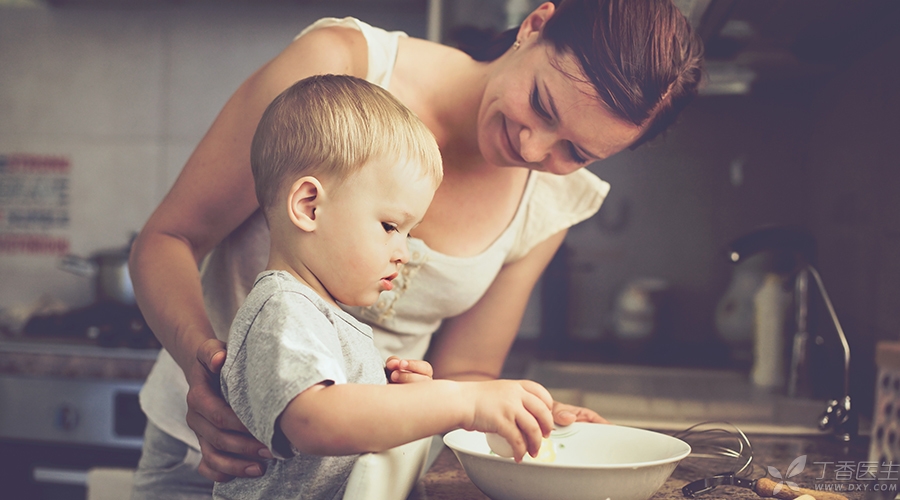
Many parents have such a wish:
I hope the baby will cause less trouble, perform well and be a sensible [little adult] obediently.
However, reality often fails to meet people’s wishes, and perhaps there is no perfect guide to teach parents how to cultivate such a child.
Don’t despair first. Psychologists have done a series of studies on the families of some excellent children abroad and found that the parents who have cultivated excellent children do not rely on luck. Most of them have such commonalities.
Let the children take on the housework.
In daily life, we often hear:
Baby, all you have to do is play with your mother and do the housework.
Children may not be able to feel your love, and over time they will form a kind of thinking: if I don’t do it, someone will do it for me. As I grow up, I will gradually lack the sense of responsibility. As an adult, it is difficult to have a good sense of teamwork and a proper way of dealing with people.
Children should know that they should not only learn to do housework, but also understand that doing housework is a part of family life.
Therefore, in life, children can try to do some less difficult housework, such as tidying up books, folding clothes, taking out garbage, etc. (click to read the article < < Should children do housework early? > >)

Let Children Learn to Socialize
Some children have poor social skills, so they always play alone, while others disagree:
One person is better! In this way, you don’t have to worry about being bullied by my baby!
If you choose to keep your child away from social intercourse in order to avoid being bullied, it is an act of picking up sesame seeds and losing watermelon.
After following up more than 700 preschool children in the United States, American scientists found that children’s social skills in childhood are closely related to their future success.
Studies have shown that children with strong social skills are better able to cooperate with others, are willing to help others, understand others, and even have strong problem-solving skills. Later, they will be more educated and thus more popular in the workplace.
At ordinary times, you can take your children for some outing or invite other children to play at home and other interactive activities to cultivate your children’s social ability. As the saying goes, it is very important to cultivate your children’s social ability and emotional intelligence. It even determines whether your children can have a bright future.
Moderate [wishing one’s son well]
A study of 6,600 children in the United States shows that parents’ expectations of their children will have a great impact on their growth.
No matter the parents with how’s economic conditions, it is the common wish of most of them. They will consciously train their children according to the expected goals.
This is also in line with a typical psychological effect-Pygmalion effect, that is to say, in essence, people’s emotions and ideas will be subconsciously influenced by others, and as much as possible to realize this expectation.
Expectations will make children feel valued, but they should not expect too much so as to cause certain pressure on children. Moderately expecting children to succeed is not harmful to children’s growth.

A harmonious family atmosphere
Some studies have shown that children living in conflicting families perform worse than children with harmonious families when they reach adulthood, regardless of whether their parents are divorced or not. Even children from single-parent families with harmonious families perform better than children from two-parent families with tense relationships.
In fact, conflicts before and after parents’ divorce will have a negative impact on children’s growth, and even some teenagers recall that they are still deeply painful and depressed more than 10 years after their parents’ divorce.
At home, parents can try their best to avoid conflicts in front of their children.

Often have a high degree
Psychologists have found that mothers with high academic qualifications are more inclined to let their children obtain the same academic qualifications.
Another U.S. Study covering 14,000 preschool children shows that children born to mothers younger than 18 are less likely to finish high school than their peers.
Even psychologists have found that by analyzing the educational level of parents when the child is 8 years old, the educational level and career development of the child in 40 years can be predicted.
Therefore, even after becoming parents, parents should continue to study and influence their children imperceptibly.
Let Children Expose to Mathematics Earlier
According to a meta-analysis of 35,000 preschool children in the United States, Canada, Britain and other countries, it is very beneficial for children to learn mathematics as soon as possible.
It is very important for children to learn mathematics knowledge as soon as possible, especially before school age. This will not only enable children to achieve better mathematics results in the future, but also train their logical ability at the same time.
Establishing Harmonious Parent-Child Relationship
Some research results show that children who receive [careful care] before the age of 3 not only have better academic performance in childhood, but also have healthier interpersonal relationships and higher educational level by the age of 30.
This may be because parents who take good care of their children tend to respond to their children’s needs in a more timely manner, making them more secure and more courageous in exploring the unknown.
Therefore, the early establishment of a harmonious parent-child relationship will benefit children for a long time and affect their whole life.
Optimistic and not anxious
Being a “tiger mother” or a “helicopter parent” is often counterproductive to children’s growth.
Psychologists say that the pressure of a mother, especially when she wants to find a balance between work and caring for her children, will have a negative impact on her children.
Once parents are under pressure, they will begin to worry. This negative emotion will spread among individuals like a cold. If parents are always exhausted or pessimistic, then children will also become unhappy.
More emphasis on hard work than intelligence quotient
Psychologists have found that people understand two ways to succeed:
One person thinks that success depends on natural intellectual ability and hard work is useless, while the other person thinks that failure is the mother of success and can be changed through hard work the day after tomorrow.
Different understanding of success will affect whether children can succeed in the future. If children think that they do well in the exam only because they are smart, then they will become [complacent]. If they think this is the result of their efforts, then they will [go further].

Mother tried not to give up her job
According to the research results of Harvard Business School, the children of those working women tend to be more educated and earn more, and men also invest more in housework and child care.
Psychologists explained that this may have something to do with the example set by the mother. If the mother continues to work hard, the child will realize the correctness of the effort, and this influence will permeate many other aspects.
In addition, children of such mothers are relatively less likely to have gender discrimination.
Reasonable Guidance of Children’s Behavior
Diana Baumride, a psychologist at the University of California in the United States, first proposed in the 1960s that parents’ education methods are mainly divided into three types: [indulgence type], [specialization type] and [authority type].
Among them, the most ideal way of education is [authoritative], and [authoritative] parents can reasonably guide their children’s behavior.
Reasonable guidance will win the respect of children and will not make them feel too depressed.
Cultivate children’s perseverance
Perseverance is [the tendency to maintain continuous interest and efforts for long-term goals].
Psychologist Angela Duckworth of the University of Pennsylvania found that children’s perseverance has a great influence on their educational level.
In addition, people with perseverance can often do many things well.
The ways to succeed are roughly the same. Persistence is the most important thing. Children should dare to imagine and realize the future they want to create with their feet on the ground.
In short, it is not luck but good education that makes children better.
Every parent wants their children to be better, so from now on, make more efforts. Let children dare to imagine and realize the future they want to create with their feet on the ground.
